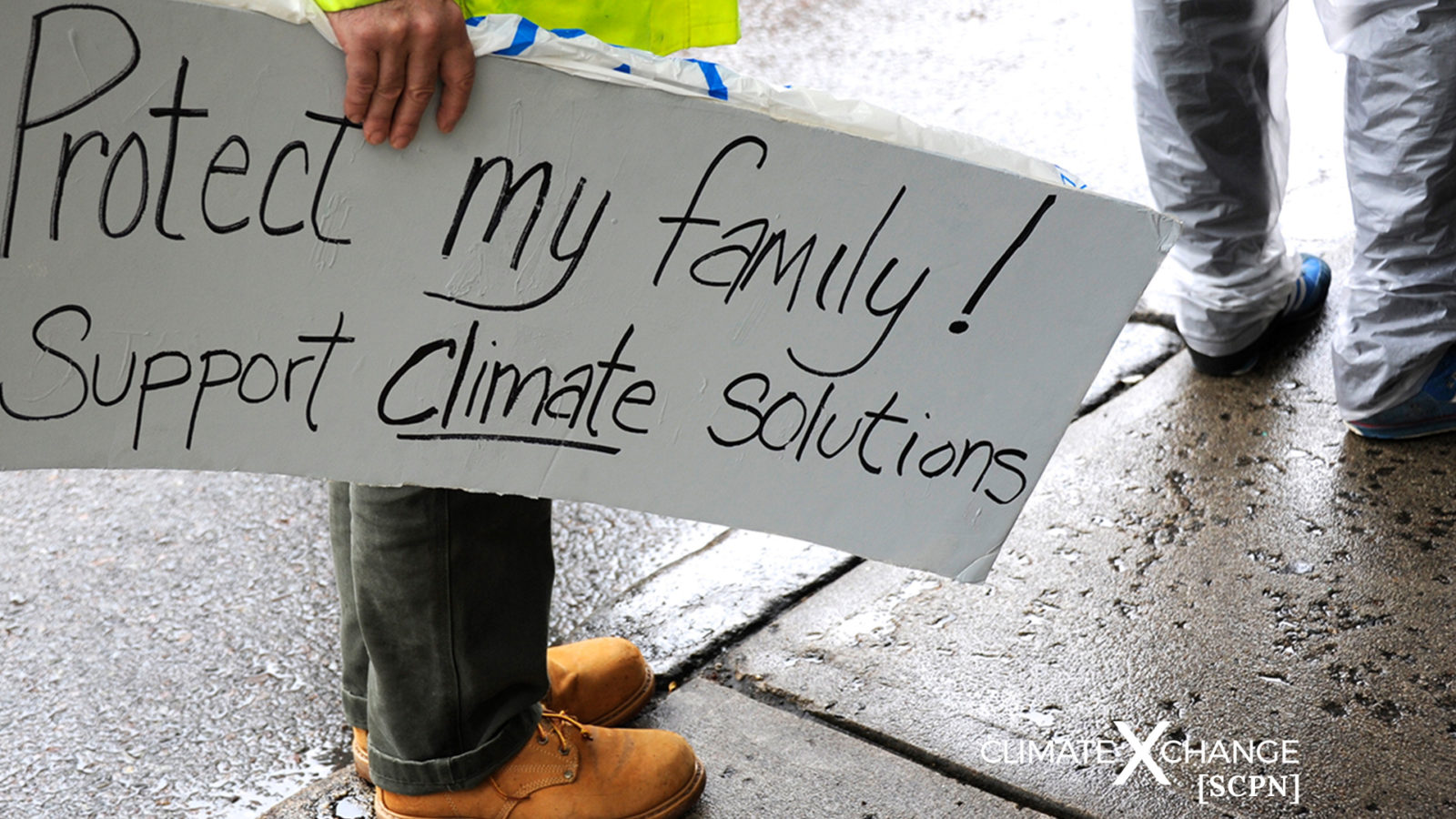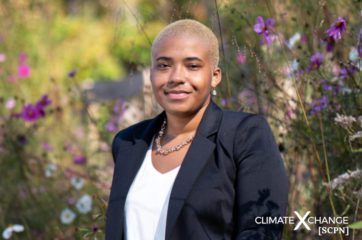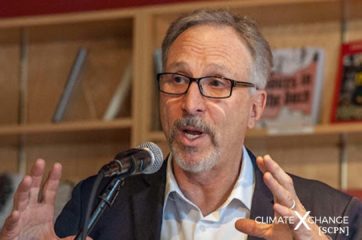When labor unions were first established in the mid-19th century, they were considered some of the most radical organizations in the country as they advocated for workers rights through civil disobedience. Today, Service Employees International Union (SEIU) 509’s Climate and Environmental Justice Committee (CEJC) works tirelessly to promote a fair green energy transition for its members and all unions. They have been instrumental in changing their own chapter’s philosophy, but also driving change within the entirety of SEIU. I was privileged to be joined by the committee and its four members. SEIU staff member Jon Grossman, and SEIU members Norah Dooley, Nina Kammerer, and Kathleen Flanagan all brought their unique perspectives to our conversation.
This interview has been edited for clarity and brevity.
Will Lemoine
Hello everybody! Today I am joined by Jon Grossman, who actually participated in Climate XChange’s monthly webinar, “The Power of Labor in a Green Economy.” I wanted to catch up with Jon to give SEIU’s perspective but also your committee’s perspective. Additionally, I am joined by SEIU members Norah Dooley, Nina Kammerer, and Kathleen Flanagan. Would you all like to tell me about what you do for SEIU 509’s climate committee? Nora, would you like to go first?
Norah Dooley
Sure! I am an adjunct professor at Lesley University, and I am one of the founding members of our SEIU unit there. I’ve been on negotiating teams serving on the chapter executive board. We have six universities and 11 units in our education chapter. I met Jon — I don’t even know what we were demonstrating — I believe it might have been disinvestment, and I saw his 509 tag! I said, ‘Well what can we do about the climate, can we get involved?’ And he said, ‘Yeah! We have a committee and you should join it tomorrow!’ And I did!
Kathleen Flanagan
Hi, Kathleen here. Actually in my day job, I work at the Department of Elementary and Secondary Education. I joined the climate team probably three years ago, and I now work as the chair. We try to meet monthly, and we work on education efforts for our members, legislation that the union can endorse, and trying to grow the CEJC. By making members aware of the great change they can make if they join and work together, we have a real opportunity to make change for the future for our members and our larger community.
Nina Kammerer
Hi, I’m Nina, and I’m a part time contract faculty member at Brandeis University. Like Nora, I have been involved in the early forming of the 509 committee. I’m also a member of the joint executive board at Brandeis, and because of that I am part of the chapter executive board. Although I might not be as knowledgeable about climate change as my colleagues, I am so happy to have the opportunity to work with them. It was through Nora that I joined the CEJC and I have the privilege of being the member representative of 509 to the Mass Renews Alliance.
Jon Grossman
Hey there. We met already, but I wanted to clarify one of the differences between myself, Kathy, and Nora is I am not a union member but a staff person who works for the union. Years ago, I was a member of another union when I worked as a mental health aid. I have been active in the labor movement — working for it for my entire career — doing a variety of different things. After reading a book by Bill McKibben, I became much more focused on climate change.
Will Lemoine
Great, thank you so much everybody. I’m curious about the committee you formed here. Nina, you said you got involved through Nora, and Nora you said you just met up with Jon at a rally at the statehouse. Do you think you could give me some more background?
Norah Dooley
Well, I didn’t mention that I was teaching storytelling for social change at Tufts. While I was teaching and focusing on a lesson about climate change, there was a pipeline that was being sent through West Roxbury [referring to the West Roxbury Lateral Pipeline] that had overwhelming opposition in pretty much every single way, but because the Governor did not oppose the pipeline it was still going to happen. Around the same time, I learned that Tufts has not divested. I said to my students, ‘are you kidding me? How are you letting them get away with this? Haven’t you done anything?’ And they said yes we are trying, but a lot of efforts have not worked. Then they asked me what I was doing with my position in the University, and I couldn’t say much.
That’s what got me out and involved. I was able to take a civil disobedience training and I actually got arrested jumping into the ditch in West Roxbury where the pipeline was going to go. That’s when I met Jon and said, ‘what are we going to do about the issues that are happening right now, right under our noses?’ And while some other SEIU chapters were at the demonstration where I met Jon, SEIU 509 was not formally represented. But, within a year, Jon got me to speak in front of the annual SEIU 509 meeting. Even though the whole chapter was not in attendance, it was great hearing prison guards, for example, that are also represented under 509 coming up to me after my talk and saying, ‘well you will be surprised to hear but I also agree with your point of view.’ It’s an issue that when you talk to people, they understand how the climate, our jobs, and how we do our jobs are all connected. As a union, we can do something about that.
Will Lemoine
Thank you so much Nora, so many good points there. As a student myself, there are so many surface-level commitments made by higher education institutions to appease concerned parties, when in reality, little has changed. Does anyone else have anything they want to add on how they came to find themselves in the committee?
Kathleen Flanagan
Well, I’m the latest member here out of the four of us. Climate and Environmental Justice has always been a serious concern of mine. I have tried to address climate issues in my personal life, and while not always necessarily successful in all of them, I realized that I could make more of a difference by joining with other people, and that’s when I came aboard. At first, it felt funny just meeting by phone without really knowing any of the members, but they are all so knowledgeable and have been fighting for a long time. Our efforts will be greatly enhanced by joining other like minded people, and our union has an amazing climate and environmental justice group; such a wealth of information. They really focused on what we can do to improve the environment every day through taking small actions. There is a lot we can do as individuals and using our own little pulpits we have by engaging our local members and elected officials there is so much else we can do. People can always engage at their own levels. This is the type of message we are trying to convey to our members, [and] when we talk to other people as well because if you relay that message, we genuinely believe that makes a world of difference.
Jon Grossman
The thing that struck me when I started learning about the climate crisis was, at first, [that] this is such a huge issue and there isn’t anything we can do about it, [and] also I don’t understand that stuff — not particularly having a science background. But when I was reading about it, people will probably survive what happens in the future, but things will be much worse. Then I started to see it as a justice issue — people are going to be forgotten and left behind. This was familiar to me and helped me frame the issue in a way I could understand. I have been involved in the labor movement for quite some time. That made me want to combine climate change with the union work, which is also about justice. If our goal is to improve life for working people, then we have to deal with the climate. Unions, when they want to work on issues, often start committees to do just that, and that’s what caused me to want to start the committee, and that’s what led me to Nora, Nina, and Kathy, and some other folks.
Nina Kammerer
I want to build on some of the things that have been said, starting with the fact that the issue of climate change is so overwhelming. But part of what inspired me to do something with Jon was the Sunrise Movement. I said if all of these young people can rise to the occasion, and overcome their despair, I better do the same. I wanted to operate where I have colleagues and the union provided the avenue to do so, and were all so different that [it] allows me to utilize my skills in a way to help the committee as a whole. I also wanted to address COPE, our political action committee that has been a very important vehicle in conjunction with this committee. It can endorse legislation, so I can create further write ups, and Nora and I can make motions in COPE to endorse legislation and bring it to the executive board. I wanted to highlight all these different dimensions of a union. In 2019, there was a push by the union leadership to develop our shared values at our annual meeting. That was the same year Nora spoke, and she helped pave the way for climate and climate justice to become one of the principles of the union.
Norah Dooley
I’m not sure if this is switching or building on, but people, in their bargaining contracts, are putting climate change concerns. For example, in higher ed, we were hoping to bargain for free public transportation. That was my dream — that every school wouldn’t sign the contract until there is free public transportation for Greater Boston. That is the kind of thing where we would have community support, student support, and just a really wide swath of concerns met at the same time. When groups of people who don’t normally work together start collaborating for a common goal, you have a movement. Something else I read that was interesting by Bill McKibben was, “people approach me and ask me what I should be doing about the climate. What I say is you should not be doing anything by yourself. You need to act with other people.” It’s not about you, it’s about us. Until it’s about us, stuff isn’t going to happen. That to me was a really big wake up call. Since I was already in a group, I wanted to utilize that. There are all kinds of people in the union, each with their own little group.
Will Lemoine
Back in January when I heard Jon speak, I really resonated with the truth that the average worker is not opposed to having a better environment for their family. The issues start to arise when their livelihoods and training they have undertaken is frequently tied to fossil fuels. I was wondering what your opinion is on how organizations could move past this fact?
Jon Grossman
Well, we have found in SEIU as we bring the issue around to people, there is general support for taking action. The questions of what and how are different. But there are unions that have a large dependence on the fossil fuel economy. However, SEIU does not represent people in that position, which is why it is relatively easy for SEIU to come out and say we need to address the climate issue. It’s not just the local but the national position of SEIU. We were one of the first unions to sign up with the national Green New Deal network. For other unions, it is not as easy as they don’t want to put their members out of a job. The way to get past this issue that seems to have promise is the whole concept of a Green New Deal, where we say we can fix this problem by putting people to work.
You hear Biden emphasizing the connection between climate and jobs. It’s still difficult, but I believe that approach is key to the solution. You need to say we’re going to put construction workers to work but instead of building new buildings, many will need to retrofit already existing structures. But as long as they are getting paid and working, then it is good for the unions. We can utilize the systems that pump methane to heat homes in New England, for example, and set them up with water for geothermal energy. Developing that approach is going to make a world of difference. The second piece is we have to have real examples of taking care of workers who do lose their jobs when a coal plant is closed, for example. There are instances of this happening (labor network for sustainability) — communities where exit deals and solutions have been negotiated. Once there are more examples of this happening, it will be much easier for unions to make the switch. The United Mine Workers of America is an example of a union that has acknowledged that coal is on the way out. While they might be stubborn in hanging on to some hopes for carbon capture, they understand a big change needs to be made or else their members will be out of work. So we’re getting there, and this coalition here in Mass (the Mass Renews Alliance) is starting to get the ball rolling.
Nina Kammerer
I would add two things to that — people who are resistant everywhere have their reasons to hesitate. Just thinking personally, until I realized that together with other people change could be possible, I was honestly trying to do my best to not think about the climate. So demonstrating that when we work together change can be accomplished is incredibly important, because we can’t be ostriches about this. For some people, making clear that there is disproportionality in impacts and that climate change is following the fault lines of society, and it is all about the people who are disadvantaged becoming more disadvantaged by fighting climate change. I think making people aware of the injustice is also very important. Getting over despair, working together, and realizing the work is going towards creating a better society is what we need to keep in mind.
Kathleen Flanagan
I did want to address the jobs and the THRIVE act once again. The Thrive Act is about the infrastructure plan Biden is trying to negotiate with Congress and the Senate, and in that plan there is a vision to transition to a greener future, green energy, green technology, buildings, with good paying union jobs, and please do go to the THRIVE Act. There is a lot of negotiation in congress over how much money should be allocated, but the funding will be going to people and their jobs and help them transition to greener technology in their jobs. This is the kind of act we need, and why we need a government to work where the people in power address the nation’s greatest needs and our greatest needs are green energy.
We need to transition away from fossil fuels, and some people do work with fossil fuels, as was discussed, but there is plenty of money there to transition people to other jobs. Our future depends on this transition, and this can’t be one corporation doing one little thing. The people of the United States need to work together and create this new future. Some of the people working on the Green New Deal are being vilified, but the Green New Deal is nothing but a positive future for our people. There is no vilification warranted. Why shouldn’t the United States be a leader in the fight against climate change? Why shouldn’t the jobs green energy provides go to our people? This takes me back to education. There is such a lack of education in this country when things are being attacked that are completely unjustified. This is what people need! The more people understand that, the better our future will be. Our future is nothing more than the decisions we make each day. We are in control of our future when it comes to climate and everything else. We have control, and that’s what sometimes we don’t understand or we forget.
Nina Kammerer
I think it is important to underscore not just across union work, but Mass Renews as an example of unions allied with other organizations. The Mass Renews Alliance, which used to be the Mass Green New Deal, is a coalition of traditional environmentalist, youth groups, environmental justice minded organizations, labor, and a number of other interest [groups] being represented. But, it is important to note that that alliance supports the AFL-CIO policy, so when SEIU passes legislation to enforce bills, they become part of the agenda and they are supporting bills from Mass Renews. On one hand, it is about building justice for jobs, and I forget how the other side is phrased, but it is about the sustainability of food. There are a number of ways the coalition functions as a large coalition. I can share with you what we have passed as a motion regarding those bills.
Will Lemoine
Jon, one of the closing statements you made [on the webinar] was, “labor is not a monolith,” and I know we have been talking about that a lot, so what would you want our readers to take away from that and our conversation as a whole?
Jon Grossman
I would say that the labor movement can be an ally in working towards climate justice, and I believe it is a necessary part of the coalition. I do not think we can succeed without it. Also, when we list frontline groups […] there are workers in the fossil fuel industry that need to be considered within those groups and treated as such.
Norah Dooley
I guess one takeaway from me would be [that] collective action is needed now. More and more collective action wherever you are, whatever group you are involved in, collective action is what we need. I don’t want to put down things like reducing your waste, but when you are doing things in a vacuum, individualism is not going to get us where we need to go. How will we survive? Will the future be the most extreme dystopia? This is fine with the ultra wealthy, they don’t really care because they can go to their bubble or try to go to mars — to which I say can you leave now! Zei Gezunt! I just think it’s really important to continue discussions. Whoever you are, talk to people and see whatever you can do to make a difference.
Nina Kammerer
I wanted to pick up on the contribution from Kathy — the work to address climate and environmental injustice is going to create the better world we are looking for. In terms of people being more connected, people having jobs that really pay wages that can support a family, and that does so in a way that is not contributing to our doom. It is not just addressing the climate crisis, but the actual actions we are taking are going to create the world we want.
Kathleen Flanagan
I said most of what I wanted to say before, but collective action, and positive collective action, like contributing and helping in the Paris Climate Accord. We need to set the standard as the richest country in the world. There is no reason we can’t do this. The talk that we don’t have money to build a better future is ridiculous — we won’t have a better future unless we build it. If you read the book, I Can’t Breathe about Eric Garner, there was no justice for Eric after he was murdered by an officer in Staten Island until SEIU got involved and they actually were a positive force and caused the community to revisit the case, and to look at what was happening with the grand jury. Unfortunately, he did not get justice, but when SEIU got involved that helped to change the narrative. SEIU getting involved in the climate crisis will help to change the narrative, and you can see some bills that have been put in the chat that 509 has endorsed. So the message is we need government action, union action, we need to work together. We have a problem with our climate issues, but that problem is the way forward to a better future when we work on it together. We can do these things we need to do while building a better future for all people. There is no reason we can’t have it and the THRIVE act, the Green New Deal — these are designed to improve our lives, and if we don’t do these things other forces will continue with their actions.
Norah Dooley
I want to build on that. I want to appreciate the Sunrise Movement and young people who really pushed the democratic party to this point. They didn’t want to have a climate on the debates, they were really hesitant and needed to be kicked really hard. Some old white lady like myself writing letters is just not going to make that happen, and you need collective action. I really appreciated their leadership on that. I really appreciated that and the way you hold people’s feet to the fire and make sure they do the things they say they are going to do by getting on the phones, texting people, hitting the streets — whatever it is you need to do to make people are aware that they can’t just do business as usual. This is not going to work. We will not let you slide around and greenwash things that you want to talk the talk but wont walk the walk.
Jon Grossman
I think the point that Nina, Kathy, and Norah made is that a lot of what’s necessary for collective action is collective action. The labor movement specializes in collective action. At least on their good days, that’s what the labor movement is about and what built it in the first place. That’s another contribution. Sit-ins became known by the United Auto Workers in 1956 Flint Michigan. That kind of action is needed because there is still opposition. People making money in the short term off of the existing economy are going to continue to resist change and the labor movement has the tactics to fight them.
Nina Kammerer
As an anthropologist, human beings are social animals. In our society, we have cut so many different links and connections. We need to rebuild those links and the kind of collective action between teams within larger groups like unions. That is part of what keeps and makes us human, and gives us the energy and the hope to keep working on a better society.









